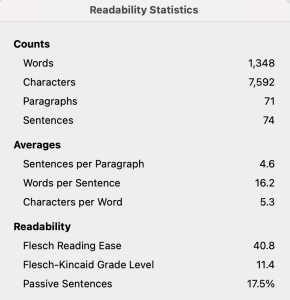CHAPTER 1: NUMBER SENSE
Chapter 1 Project: Reading Level
Reading Level
Readability is the ease of understanding a written text by a reader. The readability of the text depends on its content (e.g., vocabulary complexity and sentence structure) and its presentation (font size, line height, white space etc.).
Sophisticated computer algorithms are used to determine the reading level of books. But before computers were readily available to do the work for us there were several simple Reading Formulas and graphs that could be used. Here are two of them. Notice that they measure different things. The formulas are not indicative of how good the writing is, just how easy the text is to read.
Gunning Fog Index:
![]()
The Gunning Fog Index is considered the most reliable method for determining how difficult or easy a passage is to read and understand in English. The index estimates the years of formal education a person needs to understand the text on the first reading. The Gunning Fog Index can be a useful tool when writing for a particular audience, as it estimates how difficult the prose is to read. The Fog index comes with a few disadvantages. Even though the index serves as a good indicator of a hard text, not all difficult words are complex. It assumes a word to be hard-to-read based on the number of its syllables. For example, the words “interesting” and “registration” are hardly considered difficult words by most individuals. Nonetheless, they comprise of four syllables and, therefore, are considered as hard by the Fog index.
To use the formula you can follow these steps:
- Count the total number of words in the passage.
- Count the number of sentences in the passage.
- Count the number of words having three syllables or more in the passage. While calculating, do not add the following:
- Words that are capitalized (such as proper nouns, e.g.. Minneapolis, , etc.)
- Words that are a combination of short easy words such as undertake, bookkeeping, anyone and multinational.
- Verb forms whose number of syllables have increased by the addition of -ed, -es or -ing) such as credited.
- Put these numbers into the formula and calculate the index.
The final result determines the Fog Index, that is the reading grade level of the text.
| Fog Index | Reading Grade Level | Reading Level by Publication |
| 20+ | Post-graduate + | US government information |
| 17 – 20 | Post-graduate | Academic journal papers |
| 16 | College Senior | Standard medical consent forms |
| 15 | College Junior | MSNBC |
| 14 | College Sophomore | Breitbart |
| 13 | College Freshman | New York Times, Politico, the Guardian |
| 12 | High School Senior | BBC, Harpers, Time, Newsweek, The Wall Street Journal, LA Times, NPR, CNN, Fox, USA Today |
| 11 | High School Junior | |
| 10 | High School Sophomore | National Geographic |
| 9 | High School Freshman | Reader’s Digest |
| 8 | 8th Grade | Ladies Home Journal |
| 7 | 7th Grade | TV Guide, The Bible, Mark Twain |
| 6 | 6th Grade | People, Parade |
| Source: Gunning Mueller Clear Writing Institute Inc. https://towardsdatascience.com/how-smart-is-your-news-source-1fe0c550c7d9 |
||
Questions
- What is the difference between and relationship of reading grade and reading age?
- Use the Gunning Fog Index to find the reading grade for the following two excerpts. What does the reading grade tell us about reading age? Does a higher score mean that the book is easier or harder to read than a lower score?
Flesch Reading Ease Formula:

The Flesch Reading Ease Formula calculates a score and also presents a readability summary including the grade level required to understand the text.
To use the formula you can follow these steps:
- Count the total number of words in the passage.
- Count the number of sentences in the passage.
- Count the number of syllables in the passage. While calculating, do not add the following:
- Words that are capitalized (such as proper nouns, e.g.. Minneapolis, America, etc.)
- Words that are a combination of short easy words such as undertake, bookkeeping, anyone and multinational.
- Verb forms whose number of syllables have increased by the addition of -ed, -es or -ing) such as credited or .
- Put these numbers into the formula and calculate the index.
The final result determines the Flesch score and the table shows the relationship of the Flesch Formula score to US school grade.
| Flesch Score | Flesch-Kincaid Reading Grade (US) | Reading Level by Publication/Author |
| 90 – 100 | 5th grade | Ernest Hemmingway, Buzzfeed, Cosmopolitan, GQ, J.R.R. Tolkien |
| 80 – 89 | 6th grade | Stephen King |
| 70 – 79 | 7th grade | Harry Potter, Jane Austen, |
| 60 – 69 | 8th & 9th grade | Readers Digest, Leo Tolstoy |
| 50 – 59 | 10th – 12th grade | Time, Moby Dick |
| 10 – 49 | College | Affordable Care Act, The Economist |
| 0 – 9 | Professional | On the Origin of the Species (Charles Darwin) |
| Sources: Rudolph Flesch, The Art of Readable Writing, Harper (New York), 1949 https://towardsdatascience.com/how-smart-is-your-news-source-1fe0c550c7d9 https://www.reddit.com/r/books/comments/3l0z4t/a_chart_of_bestselling_authors_on_the/ https://www.athousandmonkeys.co.uk/post/a-complete-guide-to-readability |
||
Questions
3. Use the Flesch Reading Ease Formula to find the reading ease score for the following two excerpts. Use the table to convert that score into a correlated Flesch-Kincaid Reading Grade (US school level). Does a higher formula score mean that the book is easier or harder to read than a lower score?
4. Complete a summary table, then write a summary report explaining the reading level of each excerpt and how the two formulas compare.
| Index | Reading Grade | Reading Age |
| Fog | ||
| Flesch |
5. Based on the summary table, along with your own reading ability, do either of the formulas give an accurate reading age for the excerpts? Explain your reasoning.
6. Is it important to be able to give a reading age for a book? Explain your reasoning.
EXCERPT 1:
Pooh opened his cupboard for a pot of honey.
“Oh, bother!” Pooh cried. “Empty again. Only the sticky part’s left.”
Then Pooh heard a buzzing noise. Buzzing meant bees and bees made honey.
“And the only reason for making honey is so I can eat it!” Pooh decided.
Pooh followed the bee outside. The bee flew high up into a tree, a tree filled with sweet, delicious honey.
With his tummy rumbling, Pooh eagerly climbed the honey tree. He climbed, and he climbed.
“Honey!” Pooh declared, reaching the top. But the bees did not want to share with the bear.
They swarmed around Pooh until…oh, bother! He fell! He fell-oof!- and fell-umph!- bouncing off tree limbs until…he landed-whump!- right in the middle of a gorse bush!
“Oh, bother!” Pooh cried. “I suppose it all comes from liking honey too much!” Pooh was even hungrier than before. What was he to do?
“Think, think, think,” Pooh thought.
Pooh was joined by Christopher Robin. Pooh saw his friend’s balloon and got an idea.
From ‘Winnie the Pooh and the Honey Tree”, by A A Milne
171 words
EXCERPT 2:
Free also of his interrogation by the police, when a Justin he didn’t recognise strode to the centre of the stage and, in a series of immaculately sculpted sentences, laid his burden at the feet of his bemused interrogators – or as much of it as a puzzled instinct told him it was prudent to reveal. They began by accusing him of murder.
‘There’s a scenario hanging over us here, Justin,’ Lesley explains apologetically, ‘and we have to put it to you straight away, so that you’re aware of it, although we know it’s hurtful. It’s called a love triangle, and you’re the jealous husband and you’ve organised a contract killing while your wife and her lover are as far away from you as possible, which is always good for the alibi. You had them both killed, which was what you wanted for your vengeance. You had Arnold Bluhm’s body taken out of the jeep and lost so that we’d think Arnold Bluhm was the killer and not you. Lake Turkana’s full of crocodiles, so losing Arnold wouldn’t be a problem. Plus, there’s a nice inheritance coming your way by all accounts, which doubles up the motive.’
They are watching him, he is well aware, for signs of guilt or innocence or outrage or despair – for signs of something anyway – and watching him in vain, because, unlike Woodrow, Justin at first does absolutely nothing.
From ‘The Constant Gardener’, by John le Carré
233 words
Questions
7. Choose a book that you are currently reading or have just finished reading that is typical of the books you read. Use the Flesch Formula to find the reading score. Use the table to convert that score into a reading grade. Are you reading at a college level? Write a reflection of at least 3 paragraphs on why it is important for college students to read at a college level and how you can improve your reading level.
8. What grade level does your writing fall into? Are you writing at a college level? Find a paper that you have written in college and determine its readability. Then write a reflection on your readability statistics.
One of the easiest ways to determine readability of your own writing is by using the Flesch Index and the correlated Flesch-Kincaid Reading Grade built into Microsoft Word. Under preferences, make sure you check “Check grammar” and “Show readability statistics”.

Then run the Editor. After it’s finished, you’ll get a box showing the readability statistics.



